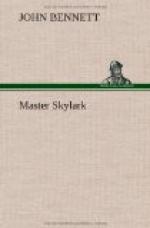A belated gull flapped by them heavily, and the red sun went down. England was growing lonely. A great barge laden with straw came out of the dusk, and was gone without a sound, its ghostly sail drawing in a wind that the wherry sat too low to feel. Nick held his breath as the barge went by: it was unreal, fantastical.
Then the river dropped between its banks, and the woods and the hills were gone. The tide ran heavily against the shore, and the wake of the wherry broke the floating stars into cold white streaks and zigzag ripplings of raveled light that ran unsteadily after them. The craft at anchor in the Pool had swung about upon the flow, and pointed down to Greenwich. A hush had fallen upon the never-ending bustle of the town; and the air was full of a gray, uncanny afterglow which seemed to come up out of the water, for the sky was grown quite dark.
They were all wrapped in their boat-cloaks, tired and silent. Now and then Nick dipped his fingers into the cold water over the gunwale.
This was the end of the glory.
He wished the boat would go a little faster. Yet when they came to the landing he was sorry.
The man-at-arms who went with him to Master Carew’s house was one of the Earl of Arundel’s men, in a stiff-wadded jacket of heron-blue, with the earls colors richly worked upon its back and his badge upon the sleeves. Prowlers gave way before him in the streets, for he was broad and tall and mighty, and the fear of any man was not in the look of his eye.
As they came up the slow hill, Nick sighed, for the long-legged man-at-arms walked fast. “What, there!” said he, and clapped Nick on the shoulder with his bony hand; “art far spent, lad? Why, marry, get thee upon my back. I’ll jog thee home in the shake of a black sheep’s tail.”
So Nick rode home upon the back of the Earl of Arundel’s man-at-arms; and that, too, seemed a dream like all the rest.
When they came to Master Carew’s house the street was dark, and Nick’s foot was asleep. He stamped it, tingling, upon the step, and the empty passage echoed with the sound. Then the earl’s man beat the door with the pommel of his dagger-hilt, and stood with his hands upon his hips, carelessly whistling a little tune.
Nick heard a sound of some one coming through the hall, and felt that at last the day was done. A tired wonder wakened in his heart at how so much had come to pass in such a little while; yet more he wondered why it had ever come to pass at all. And what was the worth of it, anyway, now it was over and gone?
Then the door opened, and he went in.
Master Gaston Carew himself had come to the door, walking quickly through the hallway, with a queer, nervous twitching in his face. But when he made out through the dusk that it was Nick, he seemed in no wise moved, and said quite simply, as he gave the man-at-arms a penny: “Oh, is it thou? Why, we have heard somewhat of thee; and upon my word I thought, since thou wert grown so great, thou wouldst come home in a coach-and-four, all blowing horns!”




